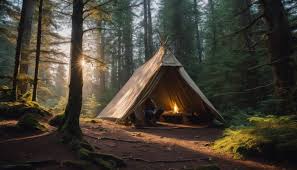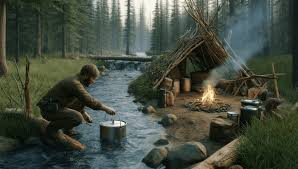Survival Skills for the Outdoors: A Comprehensive Guide to Thriving in Nature
Introduction
Exploring the great outdoors can be an exhilarating experience, but it also requires a set of essential survival skills to ensure safety and enjoyment. Whether you’re a seasoned adventurer or a novice explorer, having the knowledge and tools to survive in the wild is crucial. This guide covers the most important survival skills to help you navigate and thrive in nature.
1.Understanding the Basics of Survival
Before embarking on any outdoor adventure, it’s important to understand the core principles of survival: shelter, water, fire, and food. Prioritizing these elements can significantly increase your chances of survival in an emergency situation.

2. Building a Shelter: Protection from the Elements
Knowing how to build a shelter is essential for protection from harsh weather conditions. Use natural resources like branches, leaves, and snow to construct a shelter that provides insulation and shields you from wind, rain, or extreme temperatures.

3. Finding and Purifying Water
Water is vital for survival. Learn how to locate natural water sources such as streams, rivers, and lakes. Additionally, understand various purification methods—like boiling, using water purification tablets, or filtration systems—to ensure the water is safe to drink.

4. Foraging for Food: Identifying Edible Plants and Insects
In a survival situation, knowing how to forage for food can make a significant difference. Learn to identify edible plants, berries, and insects that are safe to consume. Always avoid anything you cannot positively identify, as some plants and insects can be toxic.

5. Navigating with and without a Compass
Navigation is a crucial survival skill. While a compass and map are ideal tools, it’s also important to know how to use natural landmarks, the sun, and the stars for direction. Practice orienteering and familiarize yourself with basic navigation techniques.

6. Signaling for Help: Attracting Attention
In an emergency, signaling for help can be life-saving. Use reflective materials, bright-colored clothing, or smoke from a fire to attract attention. Learn how to create distress signals using rocks or logs to communicate your location to rescuers.

7. Packing the Right Gear: What to Include in Your Survival Kit
A well-prepared survival kit can be a lifesaver. Essential items include a multi-tool, a first aid kit, a fire starter, a water filter, and a compact emergency blanket. Customize your kit based on the specific environment and duration of your trip.

8 .Understanding Wildlife: Avoiding Dangerous Encounters
Knowing how to handle encounters with wildlife is crucial for safety. Learn about the local animals in your area, their behaviors, and how to avoid conflicts. Carry bear spray or other deterrents if you’re in an area with large predators.

9. Planning and Preparation: The Key to Survival
Proper planning and preparation are the foundation of any successful outdoor adventure. Inform someone of your itinerary, check the weather forecast, and always carry a map and compass. Familiarize yourself with the terrain and potential hazards before setting out.

Conclusion:
Mastering survival skills for the outdoors not only enhances your experience but also ensures your safety. By learning and practicing these essential techniques, you’ll be better equipped to handle any challenges nature throws your way.
written By: Musaffa Mushtaq
